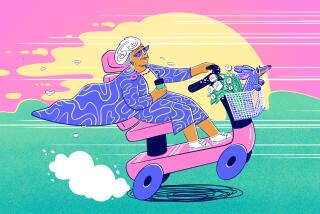Old Men Need Respect, Too--Giving the Geezer His Due : ‘The geezer emerged from adverse circumstances with a fierce independence blazed from solving problems.’
- Share via
Geezer . Rarely a term of endearment, this put-down of eccentric, crusty, cranky, disagreeable old men who, in turn, dismiss the young as whippersnappers , has come under revisionist analysis by a psychiatrist and a psychologist who suggest the geezer has gotten a bad rap. Instead, they argue, he is usually an overly sensitive, independent and misunderstood sort.
Written off in dictionaries and by a younger, more sophisticated society as simply odd, geezers, the two mental health workers suggest, should be appreciated for what they are: survivors of the American scene whose lives began in the Depression and meandered through the ensuing decades in rural or working-class existences characterized by continuing hardship, very little money and not much of a support system.
‘He Is Strong and Rigid’
“The geezer . . . emerged from these adverse circumstances with a fierce independence blazed from solving problems with his own hands,” their evaluation concludes. “Like an old oak, he is strong and rigid, but brittle.”
And geezers, suggest psychologist Loren Pankratz and Dr. Lial Kofoed, a psychiatrist, are never more misunderstood than when, laid low by medical problems they can’t shake themselves, they are forced to swallow their pride and go to the doctor. It is at this juncture, Pankratz and Kofoed suggest, that the contemplation of the geezer turns serious.
Writing in today’s issue of the Journal of the American Medical Assn., Pankratz, of the Veterans Administration Hospital in Portland, Ore., and Kofoed, of the VA hospital in White River Junction, Vt., conclude that geezers often anger their physicians so much that the doctors retaliate by labeling them as malingerers who fake their symptoms, defy their physicians and try to prolong their hospital stays.
The article makes no pretense of being a research study. It’s a commentary essay, nothing more.
In reality, conclude Pankratz and Kofoed, the geezer suffers primarily from the effects of pride. “Geezers value life experiences, in which they are rich, over formal education,” the two specialists maintain. “They believe an educated man is no better than anyone else. They resent the status and income of over-educated upstarts who have not worked as hard or as long as they have.
“The geezer is slow to seek care because he does not believe in ‘ologies’ (especially psychology), because they make common sense complicated. One 65-year-old man informed us, ‘My dad only finished the third grade, and he done all right.’ He was undoubtedly correct.”
Typical of geezers, continued Pankratz and Kofoed, was a 55-year-old maintenance worker who was written off as a faker by a young physician because, after surgery to try to repair the third of three back injuries, the man refused to return to work. Further evaluation established, however, that the 55-year-old had continued to work in intense pain for a long time and that he withheld information from his young doctors because they struck him as self-possessed whippersnappers and he was unable to communicate his feelings.
As a coping mechanism, this particular geezer intimidated his younger doctors, angering them so much that they labeled the man as a malingerer. “The primary problem, as we saw it, was a failure to see through the angry effect to the heart of the geezer beneath,” Pankratz and Kofoed concluded.
Geezers generally fare worse with women physicians. They are unacceptable to the geezer because he clings to what are now commonly seen as irrational, traditional sex role images. But he has them, nonetheless, and is likely to call a woman doctor “honey” or “nurse,” with the predictable consequences.
Differing on Destiny
Pankratz and Kofoed differ on the destiny of the geezer. Kofoed believes the geezer is, by definition, a Depression-raised character who will pass from the scene as his generation cycles through life. Pankratz, on the other hand, believes there will always be geezers and that year of birth is essentially irrelevant.
“ Geezer is the kind of term you use with your colleagues when no one else is listening. It is not the kind of term that tries to get to the essence of the person,” Kofoed said in a telephone interview. “Tomorrow’s geezers,” Pankratz said, “are now cutting logs in Oregon or farming land in the Northeast. They’re all over.”
So all the medical profession can do is wait for the geezer to appear, on his own time and his own terms. “If eccentric older men can be approached with interest, understanding and respect,” Pankratz and Kofoed said, “half the battle is won--and the war may be avoided.”
More to Read
Sign up for Essential California
The most important California stories and recommendations in your inbox every morning.
You may occasionally receive promotional content from the Los Angeles Times.













